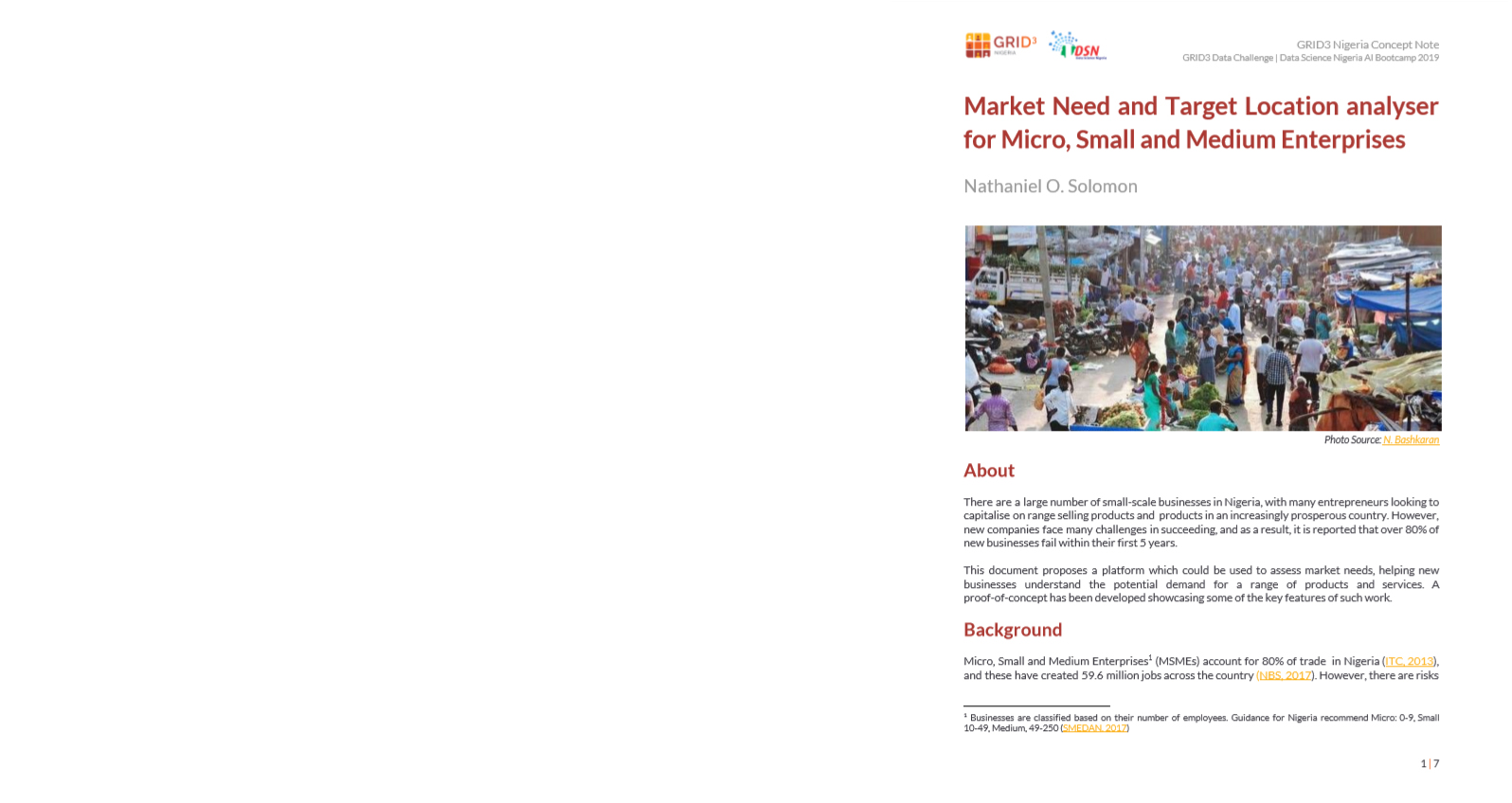[GRID3 Nigeria Data Challenge] From AI to GIS: Nathaniel O. Solomon’s approach to supporting Nigerian start-ups
‘Yosola Adekanmbi Oluwaseun and Nathaniel O. Solomon are two Nigerian artificial intelligence (AI) enthusiasts and the two winners of the 2019 GRID3 Data Challenge from the Data Science Nigeria (DSN) AI Bootcamp. This article features the journey and work of Nathaniel in his collaboration with GRID3 and DSN to learn and apply geospatial techniques for sustainable development. Read the whole background here.
Passionate about the use of technology to solve sustainable development challenges, Nathaniel O. Solomon found in data science and artificial intelligence a means to achieve his personal and professional goals. To enhance his knowledge and put into practice some of his newly acquired skills, Nathaniel followed the recommendation of his university AI community leader and joined the DSN AI Bootcamp and GRID3 sessions in November last year.
“As an advocate of development, the GRID3 programme has been contributing to my goals of leveraging technology for society and economic development as the project is aimed at creating geospatial solutions based on the capacity and developments needs of a region,” he adds.
Alongside his studies, Nathaniel experienced difficulties that many young entrepreneurs face when starting their own businesses. While “fail fast” or “celebrate failure” are common expressions in the start-up world, successfully growing a business in Nigeria is a firm goal that has never left Nathaniel’s mind. He quickly understood that providing entrepreneurs with new tools and methods to help them successfully kick-start their business was essential to the growth of his country, and the GRID3 workshops provided him a new perspective to tackle this challenge.
“I attended the GRID3 session and looking at the solutions the programme was offering, I felt like I bagged a missing puzzle for a problem I have been looking forward to solving. This concept is important to the development of my country, as it will help start-ups to hit a nail on the head.”
With this idea in mind, Nathaniel became one of the two winners of the GRID3 Data Challenge to be mentored by Alina Game, Michael Harper and Wole Ademola, three GRID3 data science experts, to develop a viable concept note from his idea. Through this work, he aimed to showcase how geospatial data could be used to support Nigerian start-ups, and contribute to promoting sustained, inclusive and sustainable economic growth, full and productive employment and decent work for all (SDG #8).
Micro, Small and Medium Enterprises (MSMEs) account for 80% of trade in Nigeria, creating 59.6 million jobs across the country. However, research shows that over 80% of Nigerian start-ups fail within their first five years. In his analysis, Nathaniel outlined the idea of a platform to verify the opportunity for a market’s scalability. Such a platform would predict the potential demand for a product, integrating a range of datasets, and help inform users of the most suitable demand. To test the feasibility of his approach, Nathaniel conducted an initial analysis on relevant datasets, to test the idea of identifying target locations for sanitary pad sales. Using GRID3 Nigeria gridded population estimates, settlement locations, GDP per capita, female literacy and roads datasets, he identified potential locations for new sites.

Market need and target location analyser for Micro, Small and Medium Enterprises in Nigeria
His full concept note, Market need and target location analyser for Micro, Small and Medium Enterprises in Nigeria, can be found here.
Despite his limited experience in GIS, Nathaniel proved to be a fast learner. Combining his entrepreneurial mindset and past experience, he brought a personal angle to his analysis: “Nathaniel’s idea was very user-centred, with small business owners at the core of his concept. It was great to see this approach to the work,” explains Alina Game.
“Throughout the process, I feel that Nathaniel has grown in confidence in his use of geospatial analysis to support decision making. His idea of designing a web platform to enable people to interact with the analysis could be a really useful tool. Such analysis would empower the millions of business-owners across Nigeria by removing the technical barriers,” details Michael Harper.
While the primary aim of the Data Challenge was to empower young data scientists to integrate geospatial data into their work, the collaboration proved to be beneficial not only from a GIS perspective.
“Having a good team will help a lot in pushing a project forward. One of the valuable things I’ve learned while working on the concept note with GRID3 colleagues is that project ideas might be ambiguous in many occasions, it’s best to approach the problems in modules and get a minimum viable product. I learned how to write a concept note and how to make good research. Working with GRID3 data was the spice to the idea,” comments Nathaniel. “Working with GRID3 and Data Science Nigeria has been a wonderful experience and I really do appreciate the effort, the ideas and lessons I got from this partnership. Working with them has been a privilege to me,” he adds.
Encouraging and supporting young data scientists in trying new methods and applying new data types was an objective the GRID3-DSN collaboration achieved:
“Nathaniel has a passion to learn and apply skills he has developed in solving real world problems. Empowering him with geospatial knowledge will further energise him to explore many other areas. His idea has a lot of potential and could support startups in scaling up to different towns and cities,” summarises Wole Ademola.
Nathaniel was one of the two winners of the GRID3 Data Challenge. Our second feature focuses on ‘Yosola’s journey into GIS to reduce the impact of solid waste management for communities in Nigeria. To read ‘Yosola Adekanmbi Oluwaseun’s story and geospatial concept, please click here.

